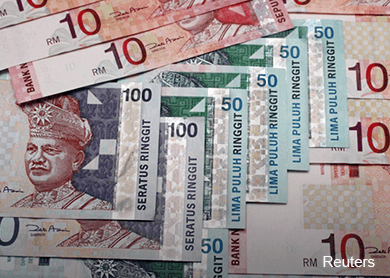
PETALING JAYA (July 1): The ringgit, which has jumped about 1% against the US dollar earlier today after Fitch Ratings affirmed Malaysia’s credit rating at ‘A-’ and revised its outlook to stable from negative, may still breach 3.80 against the greenback — albeit briefly.
Analysts today said the ringgit’s breach of the psychological level is inevitable — and that it could happen as early as the coming weeks.
“Though the ringgit may take a breather following Fitch’s status quo decision on Malaysia’s debt rating we reckon the downside risk remains on lingering controversy surrounding 1MDB, along with the bearish China and Eurozone financial markets as well as the Federal Reserve’s highly anticipated rate hike by year end,” said Kenanga Investment Bank Bhd economist Wan Suhaimi Saidie in a report today.
He also said additional domestic concerns — chiefly the 1MDB debt fiasco, high household debt as well as sharply lower revenue due to the slump in oil and gas prices which forces the government to raise its deficit target in 2015 — seemed to give investors additional reasons to dump the country’s financial assets.
“Hence, we expect the US dollar-ringgit to remain volatile, hovering in the range of 3.65 to 3.85 in the short term,” he added.
However, he said this breach of 3.80 against the US dollar would only be temporary as he expects Bank Negara Malaysia (BNM) to step in and prop up the ringgit.
He noted that in the past 12 months, the ringgit has fallen by more than 14% against the US dollar; it is still down 7.6% year-to-date despite the rally today and is still the worst performing currency in Asia so far this year.
“Malaysia remains vulnerable to capital outflows as foreigners own about 47% of MGS (Malaysian Government Securities),” he said.
However, he said the research firm expects fiscal consolidation to remain on track in spite of a sharp fall in oil and gas income, which accounts for about 30% of total fiscal revenue.
Echoing his views, AmBank foreign exchange strategist Wong Chee Seng too believes the ringgit will still break the 3.80 threshold, but that it would be short-lived.
He said this is because the ringgit’s misalignment with other regional currencies would limit the depreciation of the ringgit against the greenback.
“The ringgit tends to move along with other regional currencies but the ringgit has deviated far among peers. That, in itself, would limit certain depreciation of ringgit,” he said.
He also said the depreciation of the ringgit will be limited by the positive turnaround in Fitch’s view on Malaysia’s sovereign rating and the El-Nino occurrence, which will push up crude palm oil (CPO) and food prices.
“When CPI goes up, you have to compensate with interest rates. When you compensate a higher inflation with higher interest rate, that will strengthen the ringgit,” he added.
In a sharp contrast to its remarks earlier this year that it would more likely than not downgrade Malaysia’s credit rating, Fitch issued a statement just before midnight yesterday affirming Malaysia’s credit rating at ‘A-’ and revised its outlook to ‘stable’ from ‘negative’.
The ringgit had dipped to a 10-year low on Monday to 3.7843, ahead of the expected downgrade by Fitch Ratings and concerns that Greece is likely to exit the Eurozone.
The outlook revision lifted the local bourse’s main index 30.56 points or 1.8% to 1,737.20 in the morning trade, besides pushing up the ringgit to 3.7463 as at 3.43pm.
Wong said the effect of Fitch’s reversal on its earlier stance on the ringgit is “a slap to their (Fitch’s) face”.
“Yes, the increase in oil prices and the goods and services tax (GST) will impact consumer sentiment. The increasing government contingent liabilities will have a certain impact too. [But] at the end of the day, what do the ratings say? The rating negates all these issues,” he added.